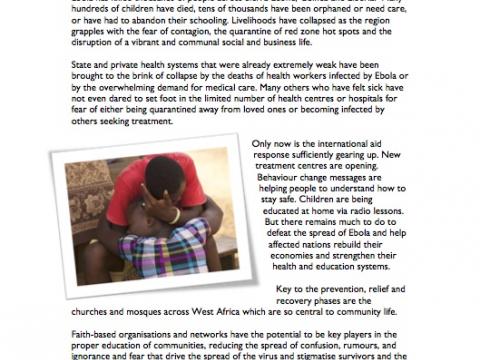Defeating Ebola: Unleashing the power of churches and mosques
Download
Ebola has killed thousands of people across Sierra Leone, Guinea and Liberia. Many hundreds of children have died, tens of thousands have been orphaned or need care, or have had to abandon their schooling. Livelihoods have collapsed as the region grapples with the fear of contagion, the quarantine of red zone hot spots and the disruption of a vibrant and communal social and business life.
State and private health systems that were already extremely weak have been brought to the brink of collapse by the deaths of health workers infected by Ebola or by the overwhelming demand for medical care. Many others who have felt sick have not even dared to set foot in the limited number of health centres or hospitals for fear of either being quarantined away from loved ones or becoming infected by others seeking treatment.
Only now is the international aid response sufficiently gearing up. New treatment centres are opening. Behaviour change messages are helping people to understand how to stay safe. Children are being educated at home via radio lessons. But there remains much to do to defeat the spread of Ebola and help affected nations rebuild their economies and strengthen their health and education systems.
Key to the prevention, relief and recovery phases are the churches and mosques across West Africa which are so central to community life.
Faith-based organisations and networks have the potential to be key players in the proper education of communities, reducing the spread of confusion, rumours, and ignorance and fear that drive the spread of the virus and stigmatise survivors and the affected.
They also have a massive potential role in caring for those who have been left behind, especially children orphaned by a disease that might have already killed their parents and siblings. Aid agencies are reporting the complete abandonment of such children by neighbours for fear of catching the disease.
World Vision is already engaging churches and faith groups and is working in coalition with other faith-based aid agencies but there is a huge opportunity to do more and to scale up in countries already struggling with Ebola as well as neighbouring nations that are at risk.